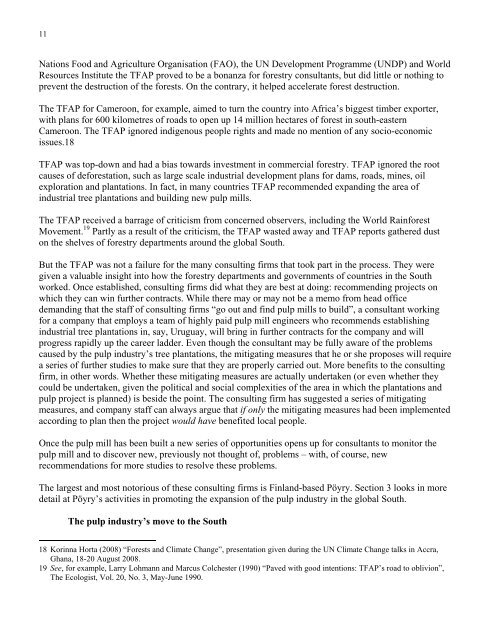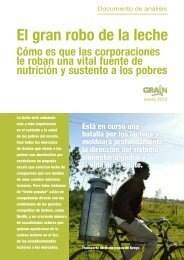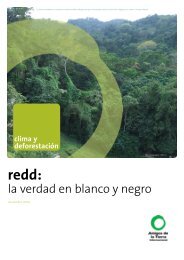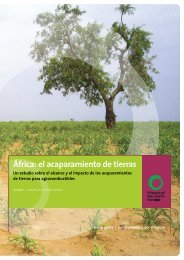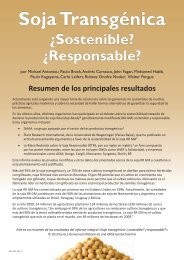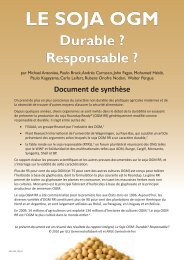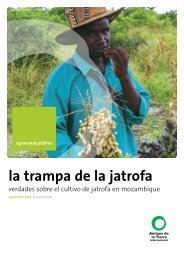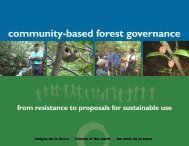Plantations, poverty and power - Critical Information Collective
Plantations, poverty and power - Critical Information Collective
Plantations, poverty and power - Critical Information Collective
Create successful ePaper yourself
Turn your PDF publications into a flip-book with our unique Google optimized e-Paper software.
11<br />
Nations Food <strong>and</strong> Agriculture Organisation (FAO), the UN Development Programme (UNDP) <strong>and</strong> World<br />
Resources Institute the TFAP proved to be a bonanza for forestry consultants, but did little or nothing to<br />
prevent the destruction of the forests. On the contrary, it helped accelerate forest destruction.<br />
The TFAP for Cameroon, for example, aimed to turn the country into Africa’s biggest timber exporter,<br />
with plans for 600 kilometres of roads to open up 14 million hectares of forest in south-eastern<br />
Cameroon. The TFAP ignored indigenous people rights <strong>and</strong> made no mention of any socio-economic<br />
issues.18<br />
TFAP was top-down <strong>and</strong> had a bias towards investment in commercial forestry. TFAP ignored the root<br />
causes of deforestation, such as large scale industrial development plans for dams, roads, mines, oil<br />
exploration <strong>and</strong> plantations. In fact, in many countries TFAP recommended exp<strong>and</strong>ing the area of<br />
industrial tree plantations <strong>and</strong> building new pulp mills.<br />
The TFAP received a barrage of criticism from concerned observers, including the World Rainforest<br />
Movement. 19 Partly as a result of the criticism, the TFAP wasted away <strong>and</strong> TFAP reports gathered dust<br />
on the shelves of forestry departments around the global South.<br />
But the TFAP was not a failure for the many consulting firms that took part in the process. They were<br />
given a valuable insight into how the forestry departments <strong>and</strong> governments of countries in the South<br />
worked. Once established, consulting firms did what they are best at doing: recommending projects on<br />
which they can win further contracts. While there may or may not be a memo from head office<br />
dem<strong>and</strong>ing that the staff of consulting firms “go out <strong>and</strong> find pulp mills to build”, a consultant working<br />
for a company that employs a team of highly paid pulp mill engineers who recommends establishing<br />
industrial tree plantations in, say, Uruguay, will bring in further contracts for the company <strong>and</strong> will<br />
progress rapidly up the career ladder. Even though the consultant may be fully aware of the problems<br />
caused by the pulp industry’s tree plantations, the mitigating measures that he or she proposes will require<br />
a series of further studies to make sure that they are properly carried out. More benefits to the consulting<br />
firm, in other words. Whether these mitigating measures are actually undertaken (or even whether they<br />
could be undertaken, given the political <strong>and</strong> social complexities of the area in which the plantations <strong>and</strong><br />
pulp project is planned) is beside the point. The consulting firm has suggested a series of mitigating<br />
measures, <strong>and</strong> company staff can always argue that if only the mitigating measures had been implemented<br />
according to plan then the project would have benefited local people.<br />
Once the pulp mill has been built a new series of opportunities opens up for consultants to monitor the<br />
pulp mill <strong>and</strong> to discover new, previously not thought of, problems – with, of course, new<br />
recommendations for more studies to resolve these problems.<br />
The largest <strong>and</strong> most notorious of these consulting firms is Finl<strong>and</strong>-based Pöyry. Section 3 looks in more<br />
detail at Pöyry’s activities in promoting the expansion of the pulp industry in the global South.<br />
The pulp industry’s move to the South<br />
18 Korinna Horta (2008) “Forests <strong>and</strong> Climate Change”, presentation given during the UN Climate Change talks in Accra,<br />
Ghana, 18-20 August 2008.<br />
19 See, for example, Larry Lohmann <strong>and</strong> Marcus Colchester (1990) “Paved with good intentions: TFAP’s road to oblivion”,<br />
The Ecologist, Vol. 20, No. 3, May-June 1990.


